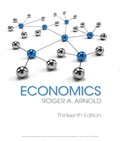
EBK ECONOMICS
13th Edition
ISBN: 8220106798607
Author: Arnold
Publisher: CENGAGE L
expand_more
expand_more
format_list_bulleted
Question
Chapter 9.1, Problem 2ST
To determine
Explain the relationship between saving, consumption and total spending.
Expert Solution & Answer
Want to see the full answer?
Check out a sample textbook solution
Students have asked these similar questions
Published in 1980, the book Free to Choose discusses how economists Milton Friedman and Rose Friedman proposed a one-sided view of the benefits of a voucher system. However, there are other economists who disagree about the potential effects of a voucher system.
The following diagram illustrates the demand and
marginal revenue curves facing a monopoly in an industry
with no economies or diseconomies of scale. In the short
and long run, MC = ATC.
a. Calculate the values of profit, consumer surplus, and
deadweight loss, and illustrate these on the graph.
b. Repeat the calculations in part a, but now assume
the monopoly is able to practice perfect price
discrimination.
The projects under the 'Build, Build, Build' program: how these projects improve connectivity and ease of doing business in the Philippines?
Chapter 9 Solutions
EBK ECONOMICS
Ch. 9.1 - Prob. 1STCh. 9.1 - Prob. 2STCh. 9.1 - Prob. 3STCh. 9.2 - Prob. 1STCh. 9.2 - Prob. 2STCh. 9.2 - Prob. 3STCh. 9.3 - Prob. 1STCh. 9.3 - Prob. 2STCh. 9.3 - Prob. 3STCh. 9 - Prob. 1QP
Ch. 9 - Prob. 2QPCh. 9 - Prob. 3QPCh. 9 - Prob. 4QPCh. 9 - Prob. 5QPCh. 9 - Prob. 6QPCh. 9 - Prob. 7QPCh. 9 - Prob. 8QPCh. 9 - Prob. 9QPCh. 9 - Prob. 10QPCh. 9 - Prob. 11QPCh. 9 - Prob. 12QPCh. 9 - Prob. 13QPCh. 9 - Prob. 14QPCh. 9 - Prob. 15QPCh. 9 - Prob. 16QPCh. 9 - Prob. 17QPCh. 9 - Prob. 18QPCh. 9 - Prob. 1WNGCh. 9 - Prob. 2WNGCh. 9 - Prob. 3WNGCh. 9 - Prob. 4WNGCh. 9 - Prob. 5WNGCh. 9 - Prob. 6WNGCh. 9 - Prob. 7WNG
Knowledge Booster
Similar questions
- Critically analyse the five (5) characteristics of Ubuntu and provide examples of how they apply to the National Health Insurance (NHI) in South Africa.arrow_forwardCritically analyse the five (5) characteristics of Ubuntu and provide examples of how they apply to the National Health Insurance (NHI) in South Africa.arrow_forwardOutline the nine (9) consumer rights as specified in the Consumer Rights Act in South Africa.arrow_forward
- In what ways could you show the attractiveness of Philippines in the form of videos/campaigns to foreign investors? Cite 10 examples.arrow_forwardExplain the following terms and provide an example for each term: • Corruption • Fraud • Briberyarrow_forwardIn what ways could you show the attractiveness of a country in the form of videos/campaigns?arrow_forward
arrow_back_ios
SEE MORE QUESTIONS
arrow_forward_ios
Recommended textbooks for you
 Economics (MindTap Course List)EconomicsISBN:9781337617383Author:Roger A. ArnoldPublisher:Cengage Learning
Economics (MindTap Course List)EconomicsISBN:9781337617383Author:Roger A. ArnoldPublisher:Cengage Learning

 Exploring EconomicsEconomicsISBN:9781544336329Author:Robert L. SextonPublisher:SAGE Publications, Inc
Exploring EconomicsEconomicsISBN:9781544336329Author:Robert L. SextonPublisher:SAGE Publications, Inc Economics Today and Tomorrow, Student EditionEconomicsISBN:9780078747663Author:McGraw-HillPublisher:Glencoe/McGraw-Hill School Pub Co
Economics Today and Tomorrow, Student EditionEconomicsISBN:9780078747663Author:McGraw-HillPublisher:Glencoe/McGraw-Hill School Pub Co

Economics (MindTap Course List)
Economics
ISBN:9781337617383
Author:Roger A. Arnold
Publisher:Cengage Learning



Exploring Economics
Economics
ISBN:9781544336329
Author:Robert L. Sexton
Publisher:SAGE Publications, Inc

Economics Today and Tomorrow, Student Edition
Economics
ISBN:9780078747663
Author:McGraw-Hill
Publisher:Glencoe/McGraw-Hill School Pub Co
